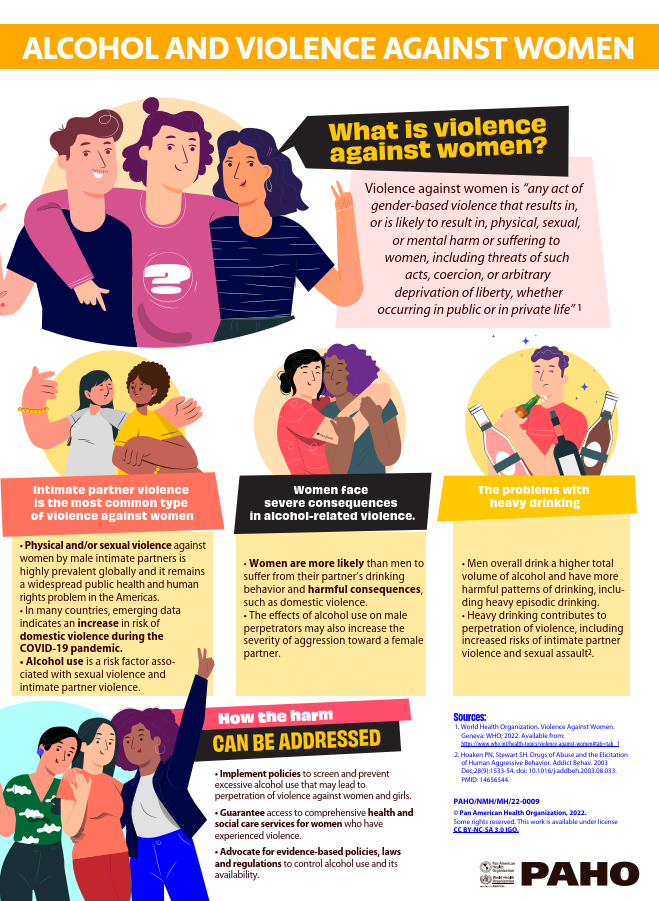The SSA’s Natalie Davies talks to two colleagues from the Pan American Health Organization (PAHO) about their new factsheet on alcohol and violence against women. Dr Maristela Monteiro is a Senior Advisor on Alcohol and Substance Abuse and Ms Britta Monika is an Advisor on Violence Prevention.
SSA: You’ve just published a new factsheet on alcohol and violence against women. Can you tell our readers about this?
PAHO: “The idea of a factsheet is to present current, objective and easy-to-understand information about alcohol, violence against women, and health. Violence against women is prevalent in the Region of the Americas, and heavy episodic drinking and heavy drinking are also prevalent in the Region, particularly among men. Alcohol use can increase the risk of male perpetration of violence and female experience of violence against women. Alcohol can also be a trigger for familial conflict. In turn, violence against women increases the risk of alcohol use disorders for survivors as the result of violence. Both issues are also closely related to the promotion of gender equality in the Americas, with violence against women being deeply rooted in gender inequality. At the same time, alcohol consumption is being heavily promoted by some as a symbol of ‘gender equality’ and ‘independence’, and can, at times, be misconstrued as a justification for violence.”
“Given the linkages between these two important public health issues, and the urgency for action on both, there is an opportunity to bring these communities together and jointly advocate for change, including policies to reduce alcohol consumption, policies to prevent violence in all its forms, comprehensive support services for survivors, and other evidence-based measures. The new factsheet offers an easy-to-use summary of key messages to inform policy advocacy and action.”
Why is violence against women such an important topic for the Pan American Health Organization (PAHO)?
“Violence against women – particularly intimate partner violence and sexual violence against women – is a major public health problem and a violation of women’s human rights. Recent estimates by PAHO/WHO suggest that 1 in 3 women and girls in the Americas have experienced physical and/or sexual violence, mostly by an intimate partner. In addition to thousands of deaths every year, violence results in physical, mental, sexual, and reproductive health consequences for women and girls, from injuries requiring emergency treatment to greater risk of sexually-transmitted infections, unplanned pregnancies, mental health conditions and substance use problems, to name only a few.”
“Beyond health, violence against women has considerable social and economic consequences, including direct costs for women and girls, their families and communities. Attention to this topic is important because evidence suggests that violence can be prevented, and its consequences can be mitigated. There is growing recognition that efforts to improve women and girls’ health and wellbeing more broadly will be limited unless we also tackle the problem of violence. In line with the “Strategy and plan of action on strengthening the health system to address violence against women”, PAHO is collaborating closely with countries and partners in the Region of the Americas to strengthen prevention and response capacities and disseminate information about what works to reduce violence in all its forms.”
The violence against women factsheet is part of your Live Better, Drink Less campaign. What other issues does this campaign cover, and what other resources can people find on your website?
“The Live Better, Drink Less campaign had the broad objective of raising public awareness about the many harms caused by alcohol and it was the first ever regional campaign PAHO developed on alcohol. We developed 13 factsheets in support of the campaign, including on alcohol and health, cancer, COVID-19, the brain, cardiovascular disease, violence, unrecorded alcohol consumption, depression, pregnancy and fetal alcohol spectrum disorders (FASD), suicide, hepatitis C, sleep, and alcohol epidemiology in the Americas.”
“The campaign was soon followed by the launch of Pahola, the first digital health worker dedicated to alcohol topics, launched in November 2021. Pahola can speak in English, Portuguese and Spanish, and can autonomously, empathetically, and anonymously interact with an infinite number of users, 24-hours a day, from any device. Pahola is freely available and provides information on alcohol, can screen users for their risk related to their drinking, assist in making a change or quit plan, as well as refer users to treatment resources in their own countries.”
“We considered it important to continue to expand the factsheet series in 2022, publishing already on alcohol and violence against women, and on alcohol warning labels. In 2022, we will be more focused on policies, as this will be the centre of the alcohol campaign. Pahola will be launched in French as well, and we are currently increasing her knowledge and ability to guide users towards healthier lifestyles and choices.”
edited by Natalie Davies
The opinions expressed in this post reflect the views of the author(s) and do not necessarily represent the opinions or official positions of the SSA.
The SSA does not endorse or guarantee the accuracy of the information in external sources or links and accepts no responsibility or liability for any consequences arising from the use of such information.

